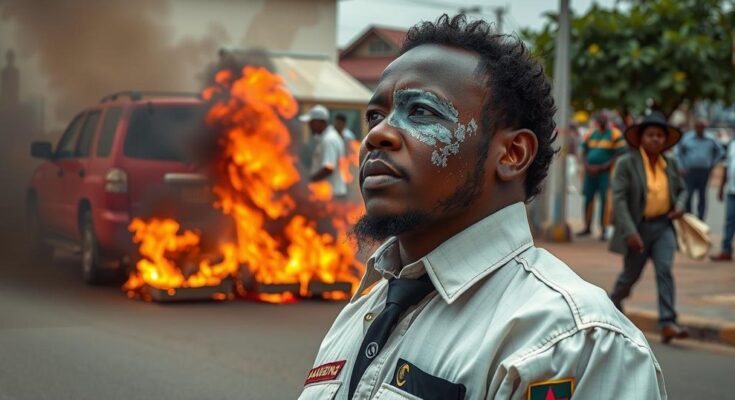Mozambique faces rising tensions ahead of the Constitutional Council’s validation of disputed election results, with opposition leader Venancio Mondlane threatening chaos if Frelimo remains in power. Protests have erupted nationwide, leading to significant violence and numerous fatalities. As both leaders discuss potential resolutions, the stakes continue to escalate, drawing international concern regarding stability in the region.
Mozambique is currently facing significant unrest as the Constitutional Council prepares to validate the disputed election results from October 9, which favored the ruling Frelimo party. With the opposition leader Venancio Mondlane promising chaos should Frelimo’s candidate, Daniel Chapo, be confirmed as the victor, tensions are escalating. Mondlane, claiming the election was rigged, indicates that he won based on his separate count, asserting his intention to assume office despite being in self-imposed exile.
As Mozambique grapples with the aftermath of these elections, protests have erupted across major cities, leading to severe disruptions and violence, resulting in at least 130 fatalities. The protests demonstrate deepening discontent among many citizens, particularly among the youth, who face widespread poverty despite the country’s resource wealth. Security forces have increasingly been accused of using excessive violence against demonstrators, raising concerns of further bloodshed.
Both Mondlane and President Filipe Nyusi have reportedly engaged in discussions, although no outcomes have been made public. Amid this unrest, international figures such as Pope Francis have called for peace and dialogue. As the verification of results approaches, observers have noted that the ramifications of the ruling could determine the political future of Mozambique, with one analyst suggesting a potential rise in violent protests likening the situation to a possible “Southern African Spring.”
The political landscape in Mozambique has been characterized by the longstanding dominance of the Frelimo party since independence from Portugal in 1975. The recent electoral process has raised significant questions regarding the legitimacy of the results, leading to a contentious atmosphere between the ruling party and opposition forces. The current unrest follows a history of tensions exacerbated by issues such as poverty, youth dissatisfaction, and violent governance practices. Mondlane’s claims of election fraud not only threaten the stability of the nation but also reflect broader regional trends of political discontent. The violence surrounding the election results has led the U.S. government to issue travel warnings, indicating international concern regarding the safety of citizens in Mozambique. The situation is further complicated by the assassination of Mondlane’s lawyer, which he attributes to the government, adding a layer of fear and distrust. As the Constitutional Council announcement approaches, many fear that the decisions made will lead to escalating conflict.
In summary, Mozambique stands on a precipice as tensions rise ahead of the Constitutional Council’s decision on the disputed election results. With the potential for increased violence and civil unrest, the outcome of this ruling may determine the future political trajectory of Mozambique. The call for dialogue from various parties signifies an awareness of the need for peace; however, the prevailing sentiments of anger and betrayal among opposition supporters may prove difficult to quell. Ultimately, the next few days will be critical in shaping the nation’s path forward.
Original Source: www.barrons.com




